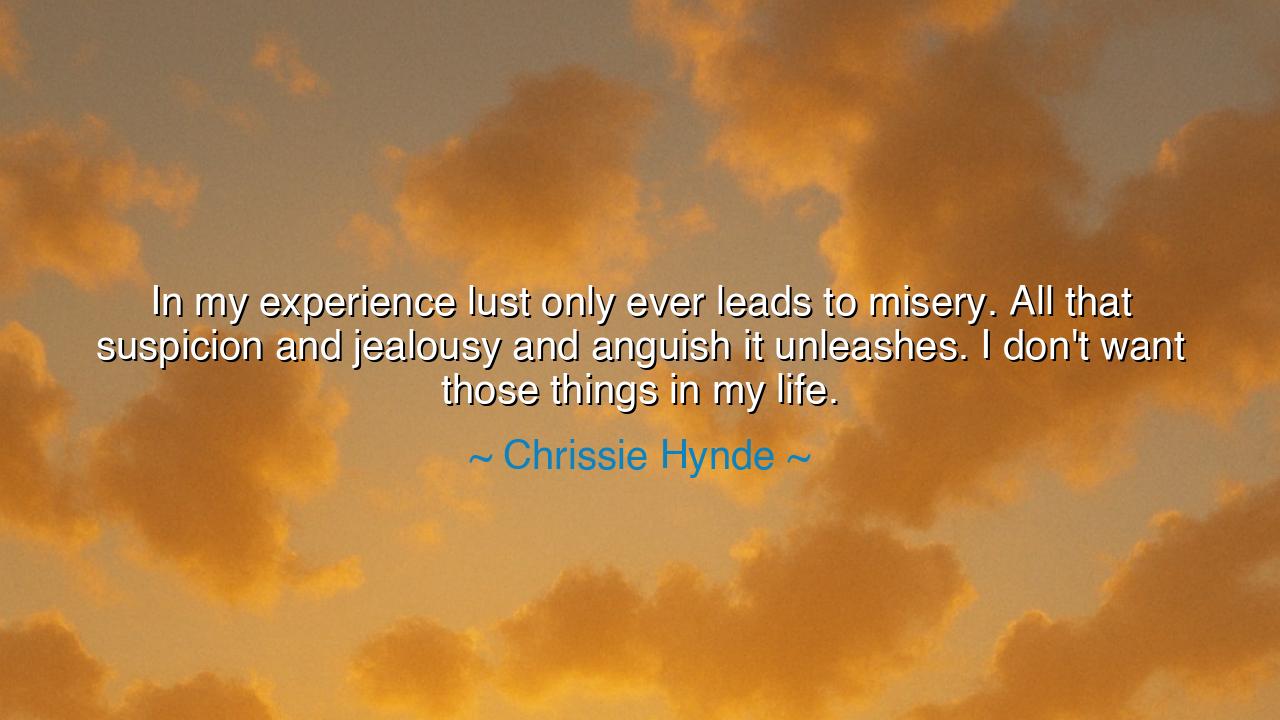
In my experience lust only ever leads to misery. All that
In my experience lust only ever leads to misery. All that suspicion and jealousy and anguish it unleashes. I don't want those things in my life.






There is a deep and time-worn wisdom in the words of Chrissie Hynde, when she said: “In my experience lust only ever leads to misery. All that suspicion and jealousy and anguish it unleashes. I don't want those things in my life.” Beneath the simplicity of her confession lies a profound recognition — that lust, though bright in its beginning, burns toward darkness if left untamed. It dazzles the senses, promising joy, yet too often it leaves behind only the ashes of suspicion, jealousy, and anguish. Hynde’s words are not the cold denial of passion, but the cry of one who has seen the cost of letting desire rule the soul.
In the ancient world, philosophers and poets spoke of this same truth. Lust, they said, is not love; it is the hunger of the body pretending to be the song of the heart. The Greeks called it eros — powerful, creative, yet dangerous when ungoverned. To them, it was fire: necessary to warm life, but deadly when it escapes the hearth. Chrissie Hynde, through her modern voice, echoes this timeless understanding. Her “experience” becomes the mirror of human nature across the ages — that where lust is allowed to reign, it drags behind it the darker spirits of possession and fear.
Consider the tragic tale of Helen of Troy. Her beauty ignited the lust of men, and from that desire came suspicion, jealousy, and war. The passion that promised ecstasy brought instead the ruin of nations. The ancients saw in her story a warning: that unbridled desire blinds reason and destroys peace. In her own way, Hynde speaks with the same clarity. She has seen that the pleasure of the moment can awaken storms in the soul, that lust seldom ends in contentment, and that love built on desire alone is as fleeting as smoke.
Her words carry the tone of renunciation — not the denial of emotion, but the choosing of peace over turmoil. She recognizes that every indulgence comes with a shadow, and that to live wisely is to know which fires to feed and which to let die. The misery she speaks of is not only heartbreak, but the inner restlessness that comes when passion turns to obsession, when affection becomes ownership, and when intimacy becomes a battlefield of the ego. She seeks to live free of that — to build a life not ruled by craving, but by clarity and calm.
It takes courage to speak as she does, for in a world that worships desire, her words sound like rebellion. Yet her wisdom aligns with that of the sages. The Buddha taught that attachment is the root of suffering; the moment we cling, we begin to fear loss, and fear becomes the seed of pain. Hynde’s reflection is the same truth dressed in the language of modern life. She refuses to be caught in the cycle of longing and loss, choosing instead the quiet strength that comes from mastery over the self.
There is beauty, too, in what her words imply — that love can exist without the poison of jealousy, that affection can be pure when freed from lust’s demands. True love, the ancients said, is not the fever that consumes, but the flame that endures. It is born not of possession, but of reverence — a love that wishes the beloved to be free. When Hynde says she does not want “those things” — the suspicion, the anguish — she is not turning away from love, but toward a higher form of it: one that nourishes rather than devours.
Let this be the lesson for those who seek wisdom: beware of mistaking lust for love. When desire whispers, listen also for the silence that follows it, for there lies the truth of its worth. If it leaves behind anxiety, envy, or pain, then it is not love but bondage. Learn to cherish without clutching, to love without needing, and to walk away from what disturbs your peace. For the heart that is at rest is richer than the one forever burning.
Thus, the teaching of Chrissie Hynde joins that of the ancients: that the wise soul does not reject passion, but masters it. She has seen the storms of desire and chosen serenity instead. Her words remind us that freedom is not found in indulgence, but in restraint — and that the greatest joy comes not from chasing every flame, but from guarding the inner light that never fades.






AAdministratorAdministrator
Welcome, honored guests. Please leave a comment, we will respond soon